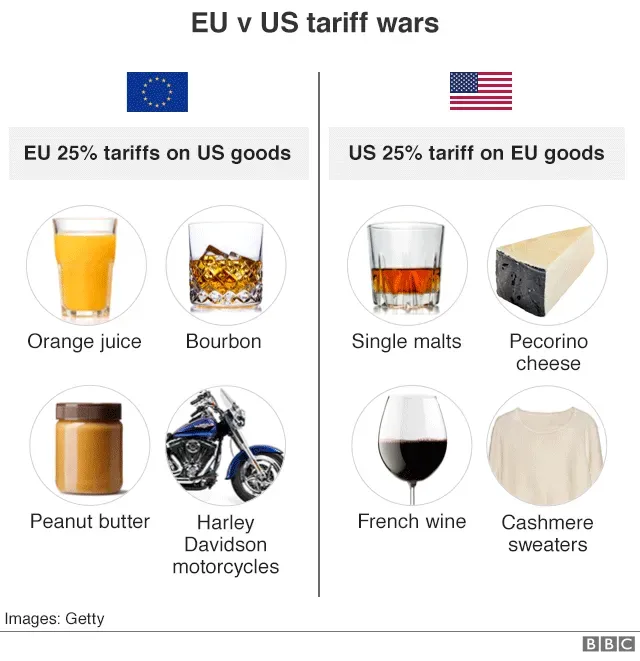As trade negotiations heat up, EU tariffs on U.S. goods are at the forefront of international relations, particularly as the European Union postpones retaliatory measures originally set to commence on August 1. European Commission President Ursula von der Leyen confirmed that this delay aims for a resolution with the Trump administration before the deadline, emphasizing the importance of reaching a negotiated agreement. With the backdrop of U.S. tariffs increasing on various imports, the stakes are high, and both sides are poised for discussions that could impact global trade dynamics significantly. The EU, representing the world’s largest economic bloc, continues to position itself strategically in these trade talks, balancing its interests against those of the U.S. Amidst this complex landscape, the repercussions of tariffs could ripple across multiple sectors, making the August 1 deadline a critical point for both EU and U.S. trade policy.
In the ever-evolving landscape of international trade, the European Union’s approach toward imposing duties on goods from the United States showcases a careful balancing act amid ongoing negotiations. The suspension of the retaliatory tariffs initially planned for introduction on August 1 reflects the EU’s strategic desire to cultivate a favorable agreement with the current U.S. administration. By initiating discussions aimed at averting further trade tensions, the EU is actively working to reinforce its position as a leading player in global commerce. This context of U.S. import taxes prompts an urgent need for diplomatic efforts that honor mutual interests and drive towards fruitful trade arrangements. As the negotiations unfold, stakeholders on both sides remain keenly aware of the potential economic impact of any tariffs imposed.
The Impact of EU Tariffs on U.S. Goods
The European Union’s decision to postpone retaliatory tariffs on U.S. goods reflects a strategic move aimed at fostering dialogue rather than escalating trade tensions. This delay offers both sides an opportunity to engage in meaningful negotiations to achieve a mutual trade agreement that benefits both economies. The potential impact of these tariffs on various sectors, including pharmaceuticals, automobiles, and agricultural products, could have far-reaching effects on consumers and producers alike.
Moreover, the EU’s position as one of the largest trading partners of the United States places significant importance on these negotiations. The discussions surrounding EU tariffs on U.S. goods are not just about trade figures; they are intertwined with broader political dynamics, including President Trump’s aggressive trade policy and the potential for a more harmonious economic relationship. Successful negotiations could lead to reduced tariffs and increased market access, ultimately benefiting businesses and consumers on both sides of the Atlantic.
Frequently Asked Questions
What are the current EU tariffs on U.S. goods?
As of now, the European Union has postponed the implementation of retaliatory tariffs on U.S. goods that were scheduled to take effect. The deadline for negotiations has been set for August 1, 2024, in hopes of reaching a favorable trade agreement with the Trump administration before that date.
Why is the EU delaying retaliatory tariffs on U.S. goods?
The EU is delaying retaliatory tariffs on U.S. goods to facilitate trade negotiations with the Trump administration. European Commission President Ursula von der Leyen emphasized that this is an opportunity for negotiation, and the EU is prepared to finalize countermeasures if an agreement is not reached by the proposed deadline.
How do U.S. tariffs affect EU trade relations?
The U.S. tariffs announced by President Trump have created significant uncertainty in EU trade relations. With potential tariffs impacting various industries, including pharmaceuticals and automotive, the EU is focused on negotiating terms that would prevent escalated trade barriers and ensure economic stability.
What is the significance of EU trade negotiations with the U.S.?
The EU trade negotiations with the U.S. are crucial as they involve the largest trading partner relationship globally, valued at approximately 1.7 trillion euros. Successful negotiations could mitigate the impact of tariffs and reinforce trade cooperation between the two economic powerhouses.
What goods are primarily affected by EU tariffs on U.S. goods?
The primary goods affected by EU tariffs on U.S. goods include pharmaceuticals, automobiles, aircraft parts, chemicals, and wine. These sectors represent significant trade volumes between the EU and the U.S., making the outcomes of tariff negotiations particularly impactful.
What would happen if the EU and the U.S. cannot reach a trade agreement by August 1?
If the EU and the U.S. fail to reach a trade agreement by August 1, the EU will proceed with its planned retaliatory tariffs on U.S. goods. The European Commission is preparing these countermeasures to ensure they are fully ready to enact them if necessary.
How have EU tariffs on U.S. goods changed under Trump’s trade policy?
Under Trump’s trade policy, U.S. tariffs have significantly impacted EU goods, prompting retaliatory plans from the EU. The changes reflect a broader strategy aimed at reducing trade deficits and protecting national security, leading to heightened tensions in EU-U.S. trade relations.
What is the impact of retaliatory tariffs on the global economy?
Retaliatory tariffs between the EU and U.S. pose a risk to the global economy by potentially disrupting trade flows, increasing costs for consumers and businesses, and creating uncertainties for companies reliant on international markets. This could lead to reduced economic growth in both regions.
What actions are European leaders taking in response to U.S. tariffs?
European leaders, including Italian Foreign Minister Antonio Tajani, are engaging in diplomatic talks with the U.S. administration to negotiate trade terms. Their focus is on achieving a mutually beneficial agreement to prevent the implementation of retaliatory tariffs on U.S. goods.
| Key Points |
|---|
| The EU is postponing retaliatory tariffs on U.S. goods to pursue negotiations by August 1. |
| European Commission President Ursula von der Leyen emphasized the need for negotiations and mentioned countermeasures are postponed. |
| President Trump announced new 30% tariffs on EU and Mexican goods effective August 1, causing a reaction from the EU. |
| The EU aims to secure a trade deal by the end of July, highlighting its role as America’s largest trading partner. |
| U.S. trade partners face uncertainty due to potential tariffs and are under pressure for favorable trade agreements. |
| Trade discussions are also expected to cover relations with China during meetings of EU trade ministers. |
| The EU is focusing on diversifying trade relationships to mitigate the impact of U.S. trade tensions. |
Summary
EU tariffs on U.S. goods are currently postponed as the European Union seeks to negotiate a trade agreement with the United States by the end of July. This decision comes in light of President Trump’s announcement of new tariffs, which were set to take effect on August 1. The EU, as the largest trading partner of the U.S., plays a critical role in global trade dynamics, and the outcome of these negotiations could have significant implications for economic relations between the two entities. This situation underscores the importance of strategic dialogue in international trade and may influence future tariff policies.



